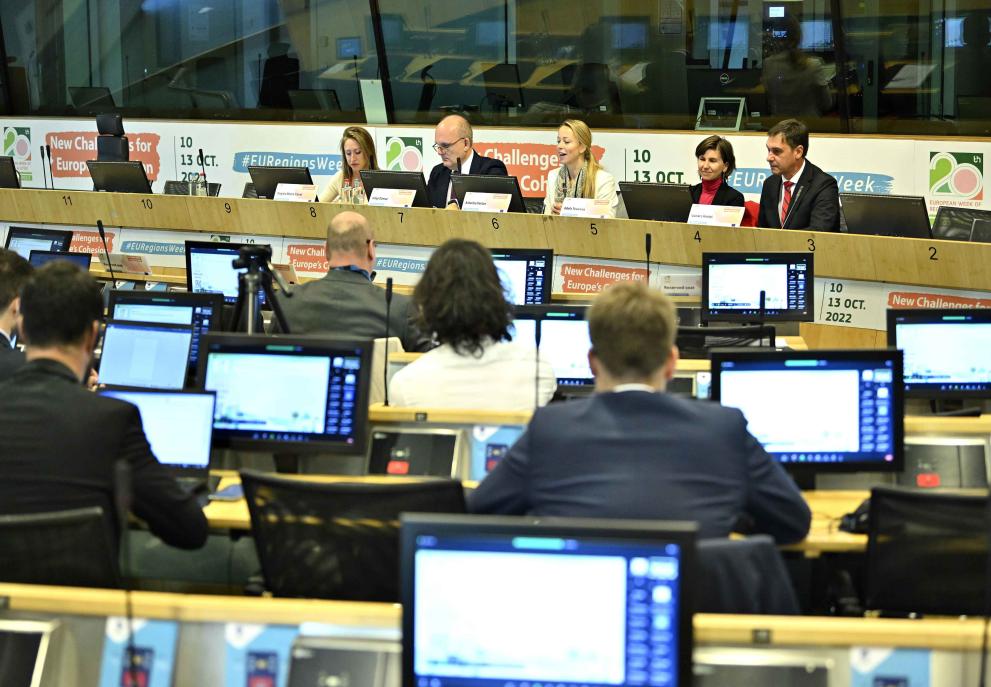
The European Commission launched on 18 May 2022 the RePowerEU plan to make Europe independent from Russian fossil fuels as soon as possible and to respond to rising energy prices and replenish gas stocks for next winter through energy savings measures, diversification of energy supplies, and accelerated roll-out of renewables.
But, how the RePowerEU impacts on European regions and cities?
What can regions, cities, energy agencies and other Covenant members do to support the achievement of the RePowerEU objectives? What are they already doing?
How can the European Commission support them? What can the Covenant of Mayors – Europe do?
These were the questions that the high-level workshop jointly organised by the Covenant of Mayors – Europe and the European Committee of the Regions tried to address and answer.
The event, organised on the 12th of October under the umbrella of EU Week of Regions and Cities, was moderated by Katerina Fortun, Policy Officer at DG CLIMA, EC:
The Climate Law is clearly setting us on a path to reduce the GHG emissions by 55% by 2030; and it’s happening: for the first time, the vision is being implemented in real material legislation, and on the ground, and you are our allies. [Katerina Fortun, DG CLIMA]
Adela Tesarova, Head of Unit at DG ENER, EC, presented how the European Commission is supporting regions and cities, focusing on funding for energy efficiency measures and related technical assistance, security of supply and deployment of renewable energy sources.
Adela Tesarova also presented the Energy Saving Sprint, a joint initiative of the European Commission, the Covenant of Mayors - Europe and the Committee of Regions to encourage cities to take measures that will immediately reduce their energy consumption.
The workshop continued with the small ceremony of the Covenant Award City in the Spotlight. The winners of this 4th edition were:
- - The city of Lisbon, in the category “Large Cities”, represented by Caterina Freitas, Municipal Director for Environment, Green Infrastructure, Climate and Energy.
Lisbon shined for its progress in climate mitigation and adaptation actions, as well as its measures to cope with energy prices and its one stop shops for citizens.
- - The city of Lahti, in the category “Medium-size Cities”, represented by Pekka Timonen, Mayor of Lahti.
Lahti achieved the highest performance in its climate mitigation progress. The jury was particularly impressed by the transversal governance in the implementation of its action plan, as well as by the involvement of local businesses to finance climate actions through a Climate partnership.
Environmental actions don’t make good numbers, but make your city better. [Pekka Timonen, Lahti].
The event continued with the intervention of Gunārs Ansiņš, Mayor of Liepaja and Covenant Ambassador for Latvia, who presented us with concrete measures that the city is implementing to save energy, from buildings renovation to mobility, and raised key questions: what do these measures mean to citizens? How can they understand the “why” behind?
Julije Domac, Director the Regional Energy Agency of North-West Croatia and member of the Covenant Europe Political Board, gave the audience good examples of transferable measures that energy agencies and regions are implementing all over Europe, stressing on the importance of knowledge sharing and on clearly communicating the reason behind the energy transformation.
When thinking about cities, regions and their energy agencies and their implementation role for REPowerEU, we should have in mind: If not cities and regions, then who else? It not now, then when?[Julije Domac, REGEA]
The last panellist was Virgina Marco Carcel, Director-General for European Affairs at Castilla la Mancha Region, speaking about the measures the region is implementing to guarantee energy supply in the territory, including investments in green hydrogen.
The event concluded with an open debate, mainly focusing on the importance of fostering the creation of energy communities as key player of the energy transition, needs of cities and regions and the support these actors need from national governments and European institutions.
Details
- Publication date
- 13 October 2022
